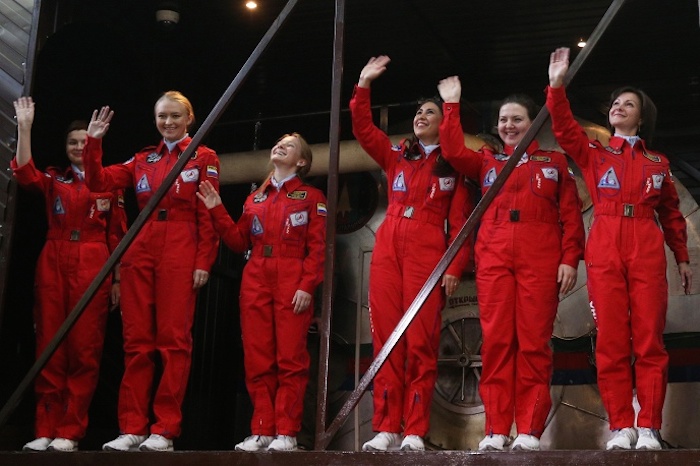.
Six women will spend eight days in mock spacecraft simulating flight conditions and perform tasks to assess their suitability
.

A crew of six Russian women have been locked away in a mock spaceship as part of an eight-day experiment to simulate conditions for a potential mission to the moon in 2029.
The experiment, the first of its kind to feature an all-female crew, is designed to “test the psychology and physiology of the female organism,” the space institute organising it said. The participants will be let out next Thursday.
Sergei Ponomarev, the scientific director of Moon-2015, said: “It will be interesting to see how well they get on with each other, and how well they are able to perform tasks. We believe women might not only be no worse than men at performing certain tasks in space, but actually better.”
The Soviet Union sent the first woman into space, cosmonaut Valentina Tereshkova, who spent almost three days in orbit in 1963, two years after Yuri Gagarin.

Earlier this week, the Russian Federal Space Agency (Roscosmos) announced plans for a manned mission to the moon in 2029. The spacecraft that will be used for the mission is currently under construction and is due for its maiden flight in 2021, according to Roscosmos. It will then dock with the International Space Station in 2023 and make an unmanned trip to the moon in 2025.
Russia and the European Space Agency are planning a joint research mission to the moon using an unmanned spacecraft in 2020, to perform a number of tests to determine how suitable the moon might be for human habitation.
The six women involved in the current experiment were narrowed down from a field of 10 potential candidates after rigorous testing over recent weeks. All of them have a background in medicine or biophysics. The crew will be expected to perform about 30 scientific experiments during the simulated flight.
The mock spacecraft is equipped with cameras and the participants will be monitored remotely by doctors and psychologists round the clock.

The experiment is expected to be psychologically taxing, but is less daunting by far than another experiment launched in 2010 in Moscow to simulate a potential mission to Mars. That saw six male volunteers spend 520 days in a capsule. A similar mixed-sex experiment in 2000 ended in disaster when two male crew members got into a fight and one tried to kiss a female crew member.
Despite the historic achievements of Tereshkova and others, the participants in the latest endeavour appeared somewhat daunted by the idea of the mock space travel, complaining about a lack of room and taking selfies in a video released by Roscosmos during the runup to the Moon-2015 experiment.
Anna Kussmaul, one of the participants, said: “I don’t know how we’ll survive without shampoo. Because even in this situation, we really want to stay looking pretty.”
.

Valentina Tereshkova, the first woman in space, and the Vostok 6 spacecraft she travelled in, at the Science museum in London.
Quelle: theguardian
.
Eight days aboard capsule as space flight experiment takes all-female flyers 'to the Moon

It's the latest in a lengthy series of tests carried out by Russia's Institute of Biomedical Problems
.
Six women aged from 22 to 34 embarked on a simulated flight to the Moon on Wednesday in a ground-based experiment conceived and monitored by Russia's Institute of Biomedical Problems.
Their eight-day unpaid Moon 2015 mission confronts them with 30 experiments aboard a mock-up environment of six cabins, kitchen, bathroom and gym akin to life on the International Space Station ISS.
It's the latest in a lengthy series of tests carried out by institute specialists studying the effects on human physiology and emotions during life among the stars. The first mission, launched in 1967, replicated 12 months on a spacecraft.
Life-support systems will sustain the crew as a list of journey tasks mounts a search for a missing moon rover and charts the progress of life-science experiments.
Showers and make-up have been left behind outside the sealed capsule, explained uniformed crew members Tatiana Shiguyeva and Darya Komissarova before departure, noting an unfamiliar hygiene regime ahead for them but which is now commonplace for flyers aboard the ISS orbiter.
So, too, is male company left behind, they add, assessing busy workdays ahead and leisure hours constrained for the time being to reading, games to play and films to watch.
Quelle: TASS
4917 Views
